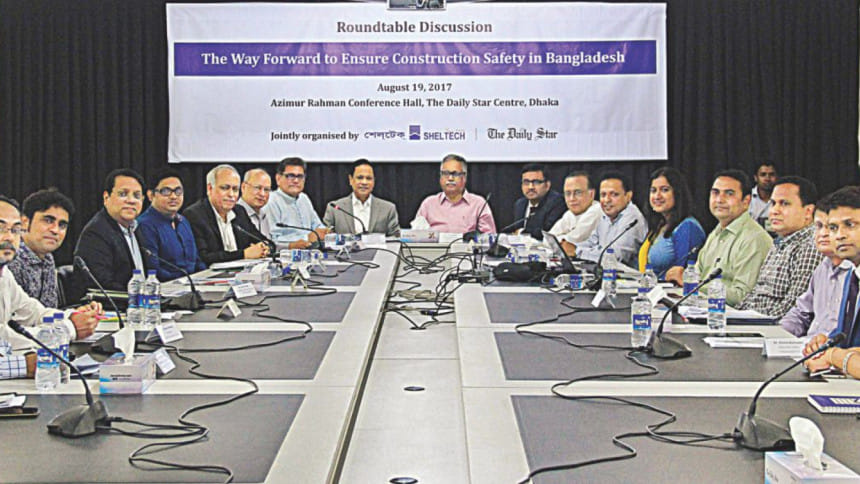Safety in Construction Sector: Set your own rules

Recruitment of workers through informal process, poor government monitoring system and lack of awareness among workers and contractors are among the major barriers to ensuring safety in the construction sector, experts say.
Speaking at a roundtable, they also said the construction firms should put in place their own safety measures and monitoring mechanism at the construction sites, instead of depending solely on the government.
They called upon the authorities concerned to follow a formal recruitment process and train workers to use safety equipment properly, saying the rights of the workers, including their safety, would not be ensured unless they were recruited in a formal manner.
Sheltech (Pvt) Ltd and The Daily Star jointly organised the roundtable, titled “The Way Forward to Ensure Construction Safety in Bangladesh”, at The Daily Star Centre in the capital yesterday.
Citing a study, Sheltech Director Saamiya Seraj said the construction industry saw deaths of 147 workers last year. On an average, 100 workers die, either falling off buildings or being electrocuted, every year. Many other workers suffer injuries and respiratory or skin diseases.
But the designated government bodies could not properly monitor safety measures at construction sites due to a lack of manpower, she said, adding that in many cases the bodies seemed confused about their roles in enforcing safety rules and ensuring accountability after death of workers.
Saamiya also said many contractors and construction firms did not show interests in taking safety precautions as they would have to pay for them.
She called upon the companies to set up their own multi-layered monitoring system and train up workers.
Syed Sultan Uddin Ahmed, executive director of Bangladesh Institute of Labour Studies, said construction industry is one of the biggest industries in the country. But the industry does not have any “permanent workers”.
“The recruitment process depends entirely on the contractors. Why such a huge industry would not have any permanent workers?”, he questioned, urging the authorities to make a policy to recruit workers in a formal way.
He claimed that many construction companies and contractors do not value workers' lives.
Architect Mubasshar Hussain, former president of Institute of Architects Bangladesh, said whoever avoids the safety measures should be punished.
Calling upon the authorities to ensure workplace safety, he said workers should get other facilities, including safe drinking water, accommodation and first aid, which in return would encourage them to follow safety rules.
Mikail Shipar, a former labour and employment secretary, said the government could not ensure safety of the workers under the labour law as they belonged to an “informal sector” because of their informal recruitment.
Ainun Nishat, professor emeritus of Brac University, said the construction companies should come forward to ensure workers' safety and the government should extend its support in this regard.
“We cannot always give all the responsibilities to the government alone,” he said.
Tanveerul Haque Probal, managing director of Building For Future Ltd and former president of REHAB, said the government should not impose any tax on purchase of safety gears.
Toufiq M Seraj, managing director of Sheltech (Pvt.) Ltd, said yesterday's roundtable was organised with a view to developing coordination among different stakeholders of the industry, including company owners, experts and academics.
Mahfuz Anam, editor and publisher of The Daily Star, said, “We are with your efforts over the safety issue. May be, many of you are doing well. There are some issues, and pointing them out is our responsibility.”
Sekender Ali Mina, executive director of Safety and Rights, said most of the construction companies did not have any safety plan, but they must formulate one, as done by Sheltech, to avoid causalities at workplace.
Brig Gen (retd) Shahedul Anam Khan, associate editor of The Daily Star; Akter Mahmud, general secretary of Bangladesh Institute of Planners; Buet teacher Prof AFM Saiful Amin; Mohammad Abu Sadeque, director of Housing and Building Research Institute; M Maksudur Rahman, a professor of Dhaka University; Nafizur Rahman, deputy director of Ministry of Power, Energy and Mineral Resources; Zaber Sadeque, an additional superintendent of police and Sultan Mahmud, president of Economic Journalist Forum, also spoke at the roundtable.

 For all latest news, follow The Daily Star's Google News channel.
For all latest news, follow The Daily Star's Google News channel. 








Comments